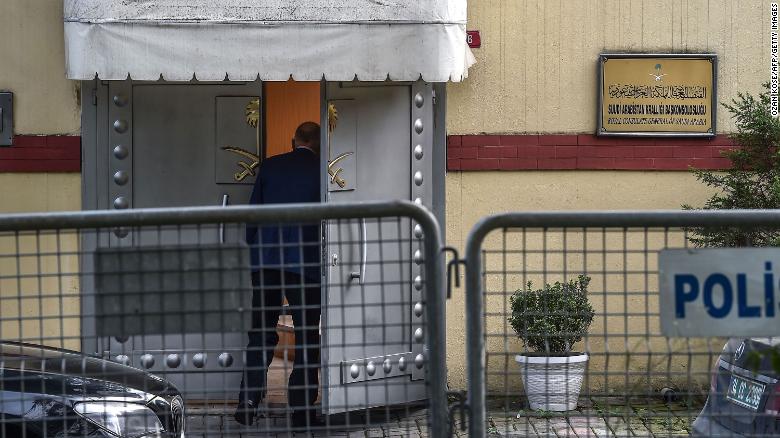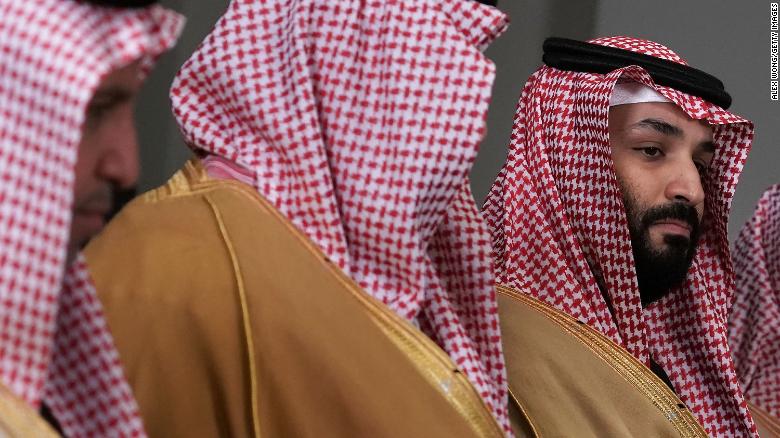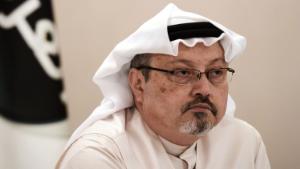Reports: Sources say Saudi journalist killed in consulate in Turkey
Unnamed Turkish officials speaking to The Washington Post and Reuters on Saturday said that prominent Saudi journalist-turned-critic Jamal Khashoggi was killed in the Saudi Arabian Consulate in Istanbul this week.
The officials have so far provided no evidence or detail on how they arrived at this conclusion.
CNN has not been able to independently confirm these reports and has not been able to get a comment from the Saudi government on the reports.
An unnamed consulate official dismissed the reports in an interview with Saudi Arabian state news agency SPA.
"The official strongly denounced these baseless allegations and expressed his doubt that they came from Turkish officials that are informed of the investigation or are authorized to comment on the issue," SPA reported.
A spokesman with the US State Department told CNN the agency is monitoring the situation but could not confirm the reports of Khashoggi's death at this time.
Khashoggi has been missing since he entered the consulate in Turkey's largest city on Tuesday, his fiancée and two other sources familiar with the event said.
Saudi Arabia has strenuously denied any involvement in his disappearance, calling the claims "false." A Saudi official said Khashoggi exited the consulate shortly after he visited. The Saudis did not, however, release any surveillance footage or other proof Khashoggi had left.
Khashoggi's fiancée, who has not been named, tweeted Saturday "Jamal was not killed and I do not believe he was killed." She went with him to the consulate Tuesday but remained outside and never saw him emerge.
Turkey probing the disappearance
The Turkish government launched an investigation into the disappearance, according to Turkey's state-run news agency Anadolu.
"His whereabouts and who is responsible will be uncovered," Omer Celik, spokesman for Turkey's ruling AK Party, said Saturday at a party meeting in Ankara, according to Anadolu.
Khashoggi's disappearance comes amid a wave of arrests of Saudi critics of the kingdom's leadership, steered by young Crown Prince Mohammed bin Salman. The crackdowns have targeted clerics, journalists, academics and activists, some of whom were detained outside Saudi Arabia.

A man enters the Saudi Consulate in Istanbul on Wednesday.
Turkish officials have said this week they believed Khashoggi remained inside the Saudi Consulate.
Wednesday, the crown prince told Bloomberg that he was willing to allow Turkey to search the consulate.
"The premises are sovereign territory, but we will allow them to enter and search and do whatever they want to do," bin Salman told Bloomberg in an interview in Riyadh, Saudi Arabia. "We have nothing to hide."
Saturday, journalists were allowed to look around.
The Committee to Protect Journalists called on Saudi Arabian officials to say what happened to Khashoggi.
"The Saudi authorities must immediately give a full and credible accounting of what happened to Khashoggi inside its diplomatic mission," Deputy Executive Director Robert Mahoney said. "The country has stepped up its repression of critical journalists in the past year at home. We hope this has not now spread abroad."
Khashoggi writes for Washington Post
Turkish police have reportedly examined surveillance footage from the area and said there is no sign of Khashoggi leaving the consulate, Turan Kislakci, the head of the Turkish Arab Media Association and a friend of Khashoggi's, told CNN.

Saudi Crown Prince Mohammed bin Salman's policies were targeted in some of Khashoggi's work.
Khashoggi, known in part for his interview with terror mastermind Osama bin Laden, was a Saudi royal court insider before he left Saudi Arabia in 2017 for Washington. He began to contribute opinion pieces to The Washington Post that were critical of bin Salman's policies, including his consolidation of power. He was named a contributing writer at the Post in January.
On Friday, the Washington Post printed a blank space where Khashoggi's column would be.
Khashoggi said the Saudi government had ordered him to stop using Twitter after he wrote a tweet cautioning against the leadership's enthusiasm about Donald Trump, then the US president-elect.
"So I spent six months silent, reflecting on the state of my country and the stark choices before me. It was painful for me several years ago when several friends were arrested. I said nothing. I didn't want to lose my job or my freedom. I worried about my family," he wrote in a September 2017 Washington Post opinion piece titled "Saudi Arabia wasn't always this repressive. Now it's unbearable."
"I have made a different choice now. I have left my home, my family and my job, and I am raising my voice. To do otherwise would betray those who languish in prison."
Colleague Jason Rezaian said he was "devastated, shocked and enraged" by the reports of Khashoggi's death.
News Courtesy: www.cnn.com











